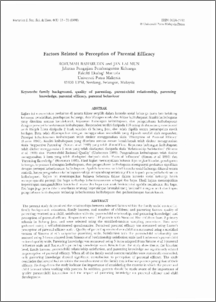Citation
Baharudin, Rozumah and Jan, Lai Mun
(1998)
Factors related to perception of parental efficacy.
Pertanika Journal of Social Sciences & Humanities, 6 (1).
pp. 13-21.
ISSN 0128-7702; ESSN: 2231-8534
Abstract
The present study determined the relationships between selected factors within the family social context i.e.
family background: education, family income, and number of children; and parenting factors: quality of parenting received as a child, satisfaction with the parent-child relationship, and parenting knowledge) and perception of parental efficacy. Respondents were 118 parents with Standard Five children from 2 primary schools in Subang Jaya, and were selected using the stratified-random sampling procedure. Data were gathered using a self-administered questionnaire. Perceived parental efficacy was measured using Luster's perception of parental efficacy scale. Quality of parenting received as a child was measured using a modified version of Simons et al.'s supportive parenting scale. Satisfaction with the parent-child relationship was assessed using 5 items adapted from Simons et al. 's relationship satisfaction scale and Umberson's parent-child rational quality scale. Parenting knowledge was measured using 5 items adapted from Simons et al. 's parental influence scale and Rozumah's parenting knowledge scale. Results from the study show that at the bivariate level, family income, parent-child relationship satisfaction, and parenting knowledge are significantly related to perception of parental efficacy. When all of the family social context variables were statistically controlled, only parenting knowledge showed significant contribution to perception of parental efficacy. The study concludes that several factors within the social context of the family may influence parents perception of their efficacy. Findings from the study indicate the importance of considering the context in which the parent and child interact when working with parents. In addition, parents should be made aware of the importance of
quality parent-child interaction and the impact of parenting knowledge on parental efficacy and child
development.
Download File
![[img]](http://psasir.upm.edu.my/style/images/fileicons/application_pdf.png)  Preview |
|
PDF
Factors_Related_to_Perception_of_Parental_Efficacy.pdf
Download (4MB)
|
|
Additional Metadata
Actions (login required)
 |
View Item |

